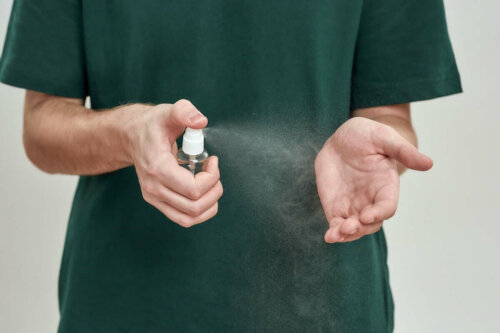Proper Male Intimate Hygiene to Avoid Infections

Intimate hygiene guarantees the well-being and comfort of both males and females. Various parts of the body require detailed hygiene, including the genitals, which are one of the most exposed due to their involvement in sexual activity and the expulsion of urine.
The genitals tend to accumulate moisture because of their functionality and close contact with clothing. However, many fail to exercise proper hygiene.
The causes may be ignorance, carelessness, or not being aware of the problems it can unleash by not having proper habits. For this reason, each of the folds that can retain dirt must be thoroughly explored during grooming.
Continue reading to learn some tips on how to take care of your genitals.
The importance of male intimate hygiene
Male intimate hygiene plays an important role in the health of the genitals and the rest of the body. Sweat, urine, and semen secretions are often present in this area, and the residues often adhere to the different parts of the penis.
As a result, bad odors, itching, burning, and other uncomfortable symptoms may occur. Also, there’s a high risk of infections due to the presence of bacteria and other pathogenic microorganisms.
Furthermore, smegma, a substance, is often around the head of the penis. It functions as a lubricant during sexual intercourse, but one must sanitize it during the daily shower to avoid inconveniences.
It accumulates dead cells, traces of grease and other substances that cause bad odors, white spots at the base of the glans, and infections that cause swelling otherwise.

Check out The Best Intimate Hygiene Tips
Tips for caring for the male intimate area
As mentioned above, the genitals are vulnerable to the development of infections due to sweating, the accumulation of substances in the folds of the penis, and the possible concentration of fungi in moist areas. You can prevent all these consequences with the implementation of proper intimate hygiene.
Things to keep in mind
- Wash daily with soap and water to remove the residues concentrated in the genital areas. In addition to sanitizing the foreskin, shaft, and testicles, men should pull back the skin of the penis and lather and clean the entire glans area. Sponges are not necessary during this process because they can injure the folds. In addition to this, they must wash the groin area to get rid of accumulated sweat.
- Dry thoroughly with a clean towel so as not to leave any wet areas that facilitate the accumulation of fungi and bacteria. Also, as far as possible, use a different towel than the one you use to dry the rest of your body. This ensures the towel isn’t damp when you dry your genitals.
- Washing with soap and water is a must after sexual intercourse as it’s the best way to instantly eliminate semen residues or bacteria you could transfer during the exchange of fluids with your partner.
- Clean and dry the area with toilet paper after urinating to avoid moisture or other substances that encourage the proliferation of bacteria.
- The daily change of underwear is as necessary as the other measures of male intimate hygiene. Also, avoid contact with clothes that accumulate dirt or sweat. Also, wear comfortable clothes, made of cotton fabrics, to avoid excessive sweating.
- Skip unnecessary products. Water and neutral soap are enough to successfully clean the entire intimate area. Products such as sprays or fragrances have no business near your genitals as their components can cause redness and irritation.

Problems associated with poor hygiene in the male intimate area
You can easily contract a disease if you don’t pay proper attention to intimate hygiene, sooner or later. These are the main problems linked to neglect in this area.
Itching and bad odor
These symptoms are a clear indication of poor hygiene. With this, the person feels discomfort during a large part of the day and cannot provide pleasant conditions for intimate moments with their partner.
Redness and inflammation
These indicate there’s excessive soiling and that some microorganisms – such as bacteria – are adhering to the moist genital folds. It can also be an adverse reaction caused by injury or the use of products containing chemicals.
Balanitis
This disease affects the glans penis. It occurs because a person didn’t clean some accumulated substances and infection-causing bacteria developed. The symptoms include irritation, itching, burning, foul-smelling discharge, and rashes on the glans penis.
Posthitis
This condition aggravates the foreskin of the penis. It’s caused by poor hygiene habits that lead to pathogenic microorganisms being stored in the skin. Its symptoms are a strong irritation that can produce pain when urinating.
Balanoposthitis
This is due to both the inflammation of the glans and foreskin at the same time. This disease is a combination of the symptoms of balanitis and posthitis, which can make it impossible to retract the foreskin.
Discover Five Intimate Habits that Aren’t as Hygienic as You Thought
Male intimate hygiene, a habit for life
It’s essential to exercise proper genital hygiene to be in good health and protect your partner from contracting infections during intimacy. Thus, all cleaning habits should happen daily so there must be constancy, dedication, and awareness.
Keep in mind that you must always handle your intimate area gently so avoid painful rubbing to prevent injury. Finally, consult a doctor if you have symptoms associated with wounds or possible infections.
All cited sources were thoroughly reviewed by our team to ensure their quality, reliability, currency, and validity. The bibliography of this article was considered reliable and of academic or scientific accuracy.
- Bonet R. Garrote A. Higiene íntima masculina y femenina [Internet]. (S.L): Dermofarmacia; 2010 [citado 16 de marzo de 2021]
- Chung JM, Park CS, Lee SD. Microbiology of smegma: Prospective comparative control study. Investig Clin Urol. 2019;60(2):127-132. doi:10.4111/icu.2019.60.2.127
- Araiza J. Montes de Oca G. Ponce Olivera R. Bonifaz A. Balanitis y balanopostitis candidósica.
Comunicación de 20 casos [Internet]. México: Dermatología Rev Mex; 2011 [citado 16 de marzo de 2021]
This text is provided for informational purposes only and does not replace consultation with a professional. If in doubt, consult your specialist.








